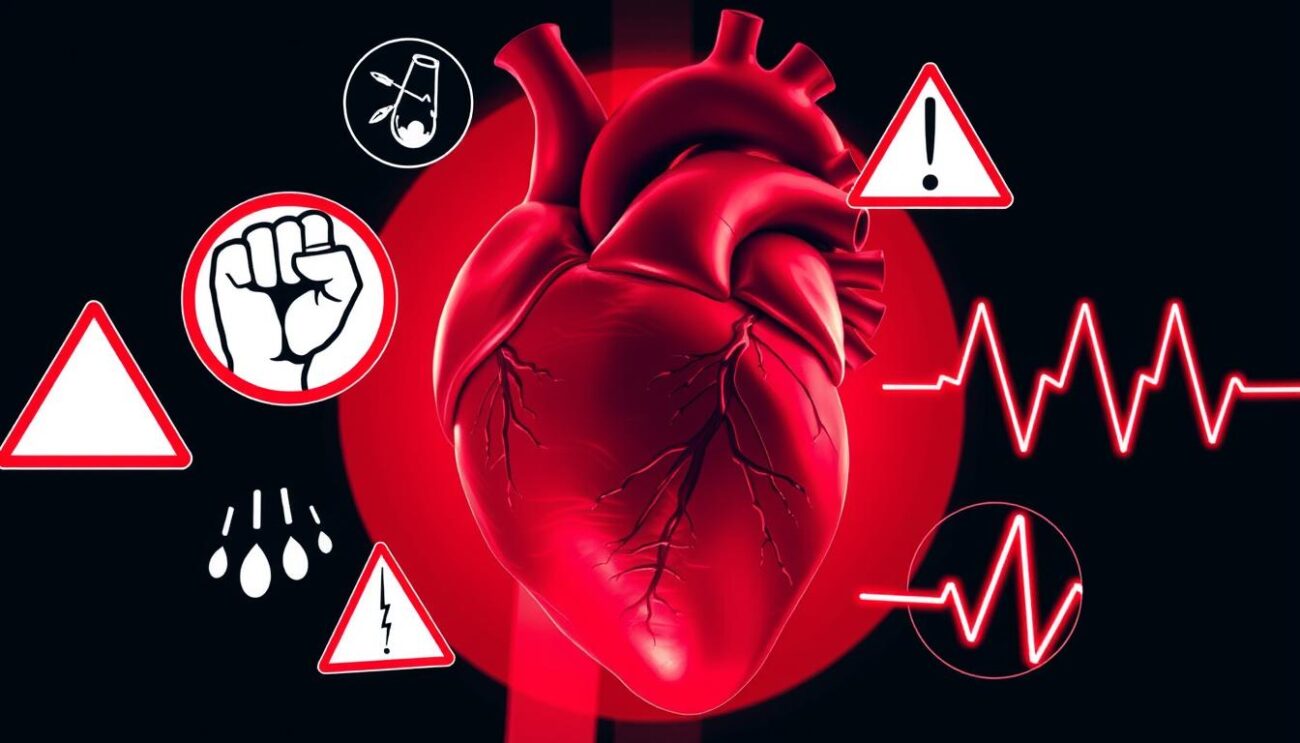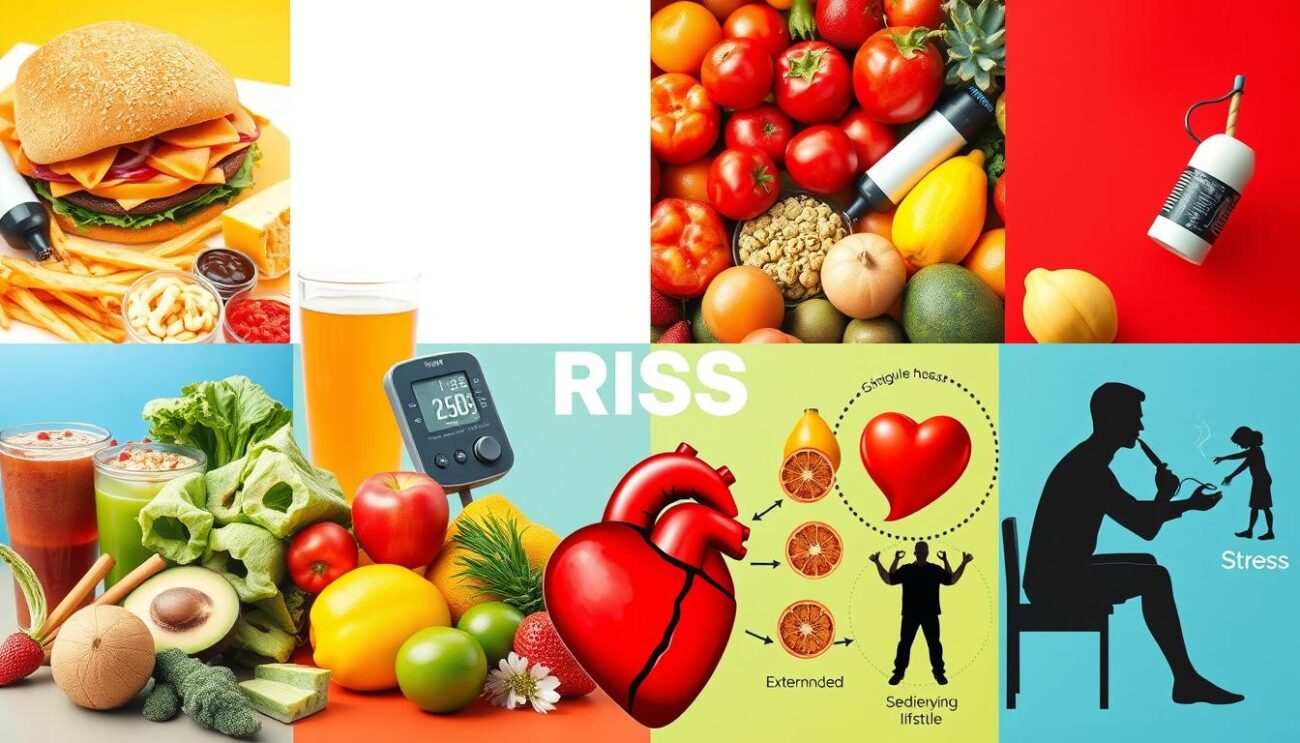Omega-3 fatty acids are key for a healthy heart. But how much do you know about their benefits? Are you getting enough omega-3s for your heart? Learn how omega-3s play a crucial role in heart health and how to add them to your diet.
Key Takeaways
- Omega-3 fatty acids are a type of polyunsaturated fat essential for your body’s functions, including heart health.
- The three main omega-3s are ALA, EPA, and DHA, with EPA and DHA being the most beneficial for heart health.
- Omega-3s offer numerous benefits for the heart, including lowering triglycerides, reducing arrhythmia risk, and improving blood pressure regulation.
- The best sources of omega-3s are fatty fish, while plant-based sources provide the omega-3 ALA.
- Eating fish rich in omega-3s at least twice a week is recommended for optimal heart health.
What are Omega-3 Fatty Acids?
Omega-3 fatty acids are a special kind of polyunsaturated fats that are key to our health. They have long chains with double bonds. Since our bodies can’t make enough, we need to eat them.
Essential Fatty Acids: ALA, EPA, and DHA
The main omega-3s are alpha-linolenic acid (ALA), eicosapentaenoic acid (EPA), and docosahexaenoic acid (DHA). ALA is in plants like flaxseeds and walnuts. EPA and DHA are in fish and fish oil.
These fats are important for our cells and health. They help our hearts, brains, and immune systems work right.
| Omega-3 Fatty Acid | Primary Sources | Key Benefits |
|---|---|---|
| ALA (alpha-linolenic acid) | Flaxseeds, walnuts, canola oil | Supports heart health, reduces inflammation |
| EPA (eicosapentaenoic acid) | Fatty fish, fish oil supplements | Helps lower triglycerides, improves heart function |
| DHA (docosahexaenoic acid) | Fatty fish, fish oil supplements | Supports brain and eye health, crucial for development |
Eating omega-3s can help a lot. They’re good for your heart, brain, and can lower disease risk.
How Omega-3s Support Heart Health
Omega-3 fatty acids are great for your heart. They help by lowering triglyceride levels, a bad fat in your blood. This fat can clog your arteries. Omega-3s make your blood flow better and lower heart disease risk.
They also reduce the risk of irregular heartbeat or arrhythmia. Arrhythmias can lead to stroke and heart problems. Omega-3s keep your heart’s rhythm steady and healthy.
Omega-3s can also slightly lower blood pressure. They make your blood vessels work better. This eases the heart’s workload and lowers hypertension risk. Omega-3s do many things to protect your heart.
| Benefit | Mechanism |
|---|---|
| Lowering Triglycerides | Reduces buildup of plaque in arteries, improving blood flow |
| Reducing Arrhythmia Risk | Regulates the heart’s electrical activity, promoting a healthy rhythm |
| Improving Blood Pressure | Enhances blood vessel function, reducing strain on the cardiovascular system |
Eating omega-3 fatty acids is a smart move for your heart. It’s a big step towards better heart health and less heart disease risk.
Food Sources of Omega-3s
Fatty Fish: Rich in EPA and DHA
Fatty fish like salmon, mackerel, and tuna are great for omega-3s EPA and DHA. These fish come from cold waters and are packed with these good fats. Eating 1 to 2 servings of fish a week is good for your heart, as advised by the American Heart Association.
Plant-Based Sources of ALA
For ALA, the plant-based omega-3, flaxseeds and walnuts are good choices. Chia seeds, canola oil, and soybean oil also have ALA. While your body can turn some ALA into EPA and DHA, eating fish is better for these long-chain fats. Adults should aim for 1.1 to 1.6 grams of ALA daily, based on age and gender.
| Food Source | Omega-3 Content (per serving) |
|---|---|
| Flaxseed Oil | 7.26 g ALA per 1 tbsp |
| Canola Oil | 1.28 g ALA per 1 tbsp |
| Chia Seeds | 2.53 g ALA per 1 tbsp |
| Cooked Salmon | 1.24 g DHA and 0.59 g EPA per 3 oz serving |
| Herring | 1.71 g omega-3s per 3 oz serving |
| Oysters | 0.67 g omega-3s per 3 oz serving |
| Walnuts | 1.28 g ALA per 7 pieces |
| Edamame | 2.16 g omega-3s per 100 g serving |
Eating a mix of fatty fish and plant-based omega-3s helps meet heart health needs. This ensures you get the right amounts of these essential nutrients.
Omega-3 Benefits for Heart Health: A Vital Guide
Omega-3 fatty acids are key for heart health and cutting down heart disease risk. They offer many benefits that protect the heart and lower heart attack and stroke risks.
Omega-3s help lower triglyceride levels, a heart disease risk factor. They also help control heart rhythm and blood pressure. This reduces arrhythmia and improves blood pressure.
Eating enough omega-3s, especially from fatty fish like salmon, mackerel, and sardines, is vital. These fish are packed with EPA and DHA, studied for heart health benefits.
Adding omega-3-rich foods to your diet is a natural way to boost heart health and prevent cardiovascular disease. By focusing on these fats, you help your heart stay healthy and strong.
“Omega-3 fatty acids are essential for maintaining a healthy heart and reducing the risk of heart disease. Consuming them regularly from food sources or supplements can have a significant positive impact on your overall cardiovascular well-being.”

Incorporating Omega-3s into Your Diet
It’s important to get enough omega-3 fatty acids for heart health. The American Heart Association suggests eating two servings of fatty fish a week. This is about 6-8 ounces of fish like salmon, mackerel, or albacore tuna. These fish are full of omega-3s, EPA, and DHA.
If you don’t eat fish often, you can try plant-based sources. Flaxseeds, walnuts, and canola oil have omega-3s too. But, the body doesn’t easily turn these into EPA and DHA, so they might not be enough.
Meeting Recommended Intakes
The daily need for omega-3s is at least 250-500 milligrams of EPA and DHA. To make sure you get enough, add these foods to your diet:
- Mackerel: 4,580 mg of EPA and DHA per serving
- Salmon: 2,150 mg of EPA and DHA per serving
- Cod liver oil: 2,438 mg of EPA and DHA per serving
- Herring: 2,150 mg of EPA and DHA per serving
- Flaxseeds: 2,350 mg of ALA per serving
- Chia seeds: 5,050 mg of ALA per serving
- Walnuts: 2,570 mg of ALA per serving
Talking to a healthcare provider can help figure out the right omega-3 intake for you.
Omega-3 Supplements: Pros and Cons
Omega-3 supplements like fish oil pills might help some people. But, the science on their benefits is not clear-cut. If you have heart disease or high triglycerides, they might be good for you. Always talk to a doctor before starting them, as the right amount and type can vary.
One big plus of omega-3 supplements is they can lower triglyceride levels. This can lower heart disease risk. They might also modestly lower blood pressure in people with high blood pressure. Some studies show they can ease rheumatoid arthritis symptoms like pain and stiffness.
But, the link between omega-3 supplements and heart health is not clear. Some studies found little benefit, while others suggest they might lower heart disease risk. It’s a mixed bag.
Omega-3 supplements are usually safe when taken as directed. But, they can cause side effects like bad breath and heartburn. Rarely, they might increase bleeding and stroke risk at high doses.
Before starting omega-3 supplements, see a doctor. They can figure out the best dose for you based on your health and needs.
“Omega-3 fatty acids have a strong evidence of significantly reducing blood triglyceride levels and a slight improvement in HDL (“good”) cholesterol, although an increase in LDL (“bad”) cholesterol levels was also observed.”
Balancing Omega-3 and Omega-6 Intake
It’s important to balance omega-3 and omega-6 fats in your diet. Omega-6s can cause inflammation if you have too much. Some say the omega-6/omega-3 ratio is key, but the perfect ratio is still up for debate.
Experts mostly focus on how much EPA and DHA you get, not the ratio. Still, a good ratio is between 1-to-1 and 4-to-1. But, the Western diet often has a ratio of 15-to-1 to 17-to-1, leading to more inflammation.
The Omega-6/Omega-3 Ratio Debate
The Food and Nutrition Board of the U.S. Institute of Medicine says adult males need 1.6 grams of ALA omega-3s daily. Adult females need 1.1 grams. For omega-6s, males need 17 grams, and females aged 19-50 need 12 grams.
While the best ratio is still debated, research points to a balanced intake of omega-6 and omega-3 as beneficial. Too much omega-6, especially from soybean oil and processed foods, can raise the risk of death from cancer and heart disease.
To keep a healthy balance, eat more omega-3-rich foods like oily fish. Limit foods high in omega-6s, such as vegetable oils and processed snacks. This can help your health and lower inflammation risks.
Assessing Your Omega-3 Status
Plasma and Erythrocyte Fatty Acid Analysis
You can check your omega-3 levels with blood tests. These tests look at omega-3 fatty acids in your plasma or red blood cells. Plasma tests show what you’ve eaten recently. Erythrocyte tests show your omega-3 levels over the past few months.
The omega-3 index is a measure of EPA and DHA in your red blood cells. It helps figure out your omega-3 status and heart disease risk. Doctors can order these tests to see if you’re getting enough omega-3s from your food.
The report looks at omega-3 intake in the U.S. It uses data from the NHANES III database. It aims to find out the average omega-3 intake in the U.S. and in different groups. It also checks if there’s a difference in intake between people with and without heart disease.
There are different ways to measure omega-3 intake. These include ALA, EPA, DHA, and sometimes SDA and DPA. These are found in fat tissues, red blood cells, plasma, or plasma phospholipids. Knowing your omega-3 levels helps doctors advise on diet and supplements for better heart health.







